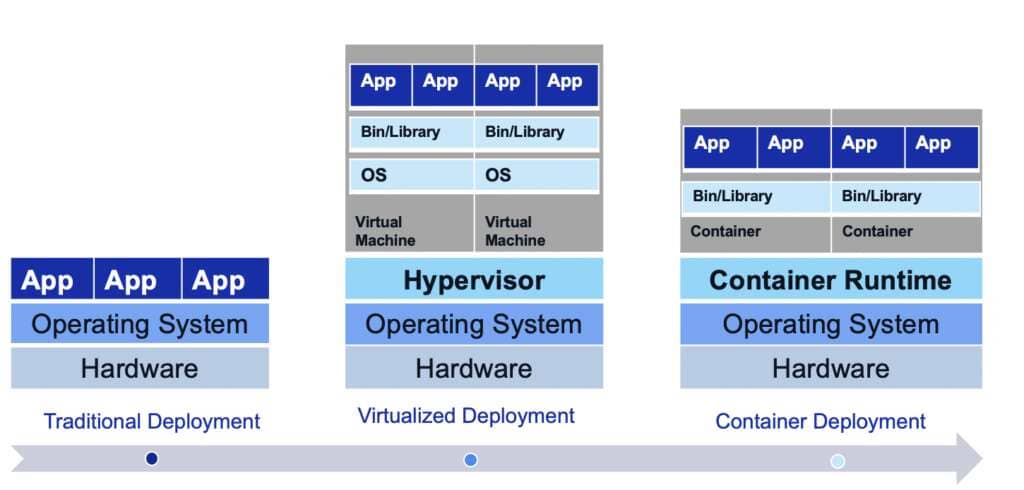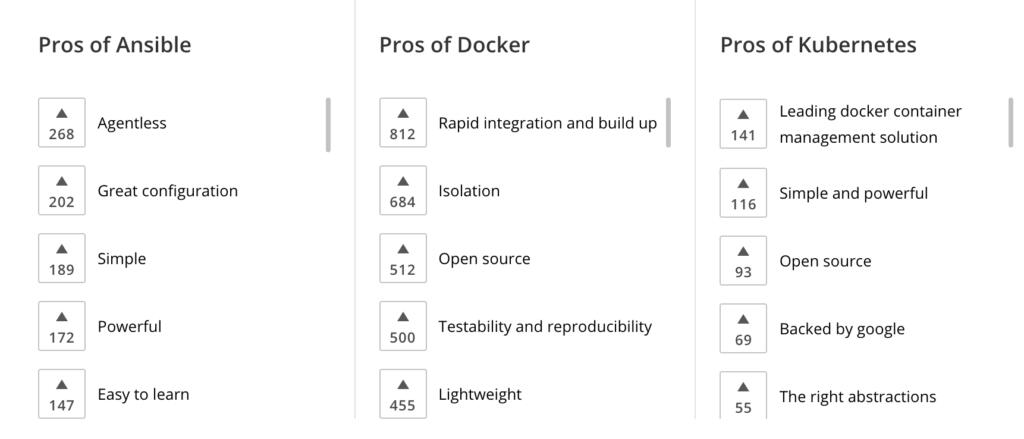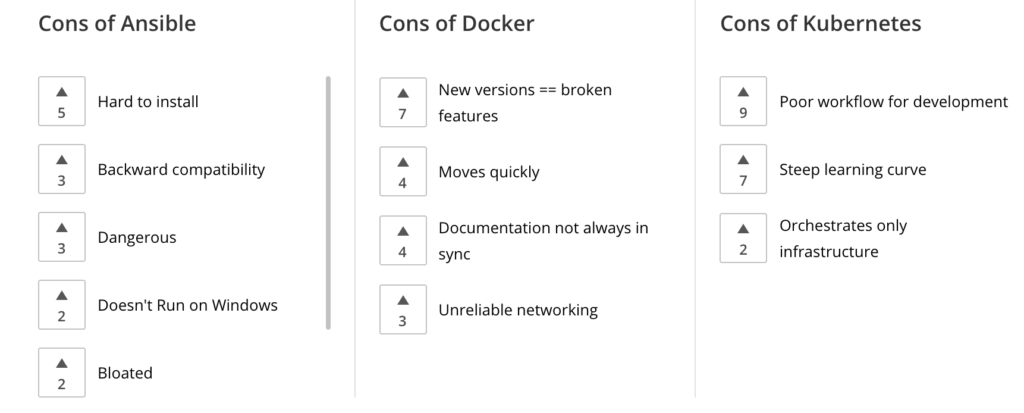|
|
DevOps Tool Comparison: Docker Vs Kubernetes Vs Ansible
Now some of the geeks would argue why am I comparing these tools as they are totally different. One reference is you have Microsoft Word, and Microsoft excel. Sure they can do some of the same things but combined they can do a lot.
If you have just entered the DevOps Arena, its easy to get confused in these three tools – Kubernetes, Docker, Ansible. Additionally, if you are planning on doing any cloud certification, a common exam topic is DevOps. It is important to understand the basics of these tools not only for the purpose of the exam but these are great tools to make you a better developer and/or DevOps guru. Also, check out reviewnprep.com to prepare for your next certification.
What is DevOps?
The term DevOps has become a buzz word in the technology companies and if you are not new to IT, and still haven’t heard of this term, it’s time to read on. From startups to large enterprises, everyone is leveraging DevOps tools to support their business processes, from project planning until delivery. DevOps is an operational culture that aims at continuous integration and continuous development (CI/CD), and rapid IT service delivery by promoting better communication and improved collaboration between developers and operators.
What is Containerization?
Containerization is an approach of running applications on an OS such that the application is isolated from the rest of the system. You create an illusion for your application that it is getting its very own OS instance, although there may be other containers running on same system. Containers also simplify configuration management when upgrading or replacing some of the running microservices in a live environment because they eliminate downtime and maintenance windows.
Let us look at the below image for the evolution of application deployment.

What is Infrastructure as Code (IaC)?
As per the good old wiki – Infrastructure as code (IaC) is the process of managing and provisioning computer data centres through machine-readable definition files, rather than physical hardware configuration or interactive configuration tools. A quick internet search for “infrastructure-as-code”, you would see a list of the popular tools: Chef, Puppet, Ansible, SaltStack, CloudFormation, Terraform and many others. What’s not easy is figuring out which one of these you should use. So, read on!!
What is Docker?
Docker is a software container technology platform that enables its users to create, deploy, run, and manage applications within the containers. Build on Linux Containers (LxC) it gives freedom to application/infrastructure developers and IT operation teams to create virtual environments and a platform for improved innovation and collaboration. Docker containers run within the kernel of the host machine and they don’t require additional hypervisor load, so they are lightweight. In other words, Docker is what enables us to run, create and manage containers on a single operating system.
Then there is Docker Swarm. Swarm turns a pool of Docker hosts into a virtual, single host. Swarm is especially useful for people who are trying to get comfortable with an orchestrated environment or who need to adhere to a simple deployment technique but also have more just one cloud environment or one particular platform to run this on. In nutshell, Docker is an open-source tool that allows you to Build, Ship, and Run applications, Anywhere.
What is Kubernetes?
Kubernetes is a container as a service (CaaS) project released by Google. It helps you to manage a containerized application in various types of physical, virtual, and cloud environments. If you have Docker installed on a bunch of hosts (different operating systems), you can leverage Kubernetes. These nodes, or Docker hosts, can be bare-metal servers or virtual machines. Kubernetes can then allow you to automate container provisioning, networking, load-balancing, security and scaling across all these nodes from a single command line or dashboard. Making the application(s) more scalable and making the infrastructure more robust are two best reasons for opting for multiple nodes. In other words, it is a container orchestration platform. A collection of nodes that are managed by a single Kubernetes instance is referred to as a Kubernetes cluster. Kubernetes is changing the DevOps approach to configuration management and deployment at scale.
What is Ansible?
Ansible is an open-source software solution that doesn’t depend on the typical client-server model. Ansible helps with difficult and time-consuming processes and converts them into repeatable playbooks, which increases production speed while bringing a much-needed element of simplicity. Ansible automates IT requirements such as application deployment, cloud provisioning, and container orchestration.
Difference between Ansible vs Kubernetes vs Docker
To begin with, let’s look at Ansible vs Kubernetes – which is an often confusing topic. Ansible is an IT automation tool that deploys software, configures systems, and organizes more complex IT functions such as rolling updates or continuous deployments. Ansible is an infrastructure automation engine that automates software configuration management. On the other hand, Kubernetes is a system designed to orchestrate Docker containers. In principle, Kubernetes can work with any containerization technology. It manages workloads and uses nodes to handle scheduling to make sure that their condition matches the users’ expectations.
As for the difference between Docker vs Kubernetes. Practically, Docker can run without Kubernetes and Kubernetes can function to the fullest without Docker, using both in co-op improves the functionality of each other. Here is a quick summary:
| Category | Kubernetes | Docker |
|---|---|---|
| Scaling | It offers auto-scaling. | It does not offer auto-scaling. |
| Installation | Could be difficult to install based on where you are in your DevOps Journey. | It is relatively easier to install. |
| Load-balancing | Load-balancing settings need to be configured manually. | Docker Swarm mode allows an easy and fast load balancing setup with minimal configuration. |
| Logging and monitoring | It offers an in-built tool. | It does not offer an in-built tool. |
| Scalability | Scaling up is relatively slower. | Scaling up is fast. |
| Tolerance ratio | It has low fault tolerance. | It has a high fault tolerance. |
| Optimization | It is optimized for numerous small clusters. | It is optimized for a single large cluster. |
| Customization | It offers more customization. | It offers relatively less customization. |
| Sharing data volume | It shares data volume with any container. | It shares data volume only with the containers in the same pod. |
Docker and Kubernetes are great tools for deploying applications. However, these DevOps tools by themselves do not provide a full-blown automation experience. Fortunately, Ansible comes to rescue to plug any operations gaps in Docker and Kubernetes. Ansible is agentless and allows us to use SSH keys for connecting to remote machines. Ansible playbooks are written in yaml and offer inventory management in simple text files.
Top Pros Ansible vs Docker vs Kubernetes

Top Cons Ansible vs Docker vs Kubernetes

All of them are open source, backed by large communities of contributors, and work with many different cloud providers. The DevOps focus has now shifted to writing scalable applications that can be distributed, deployed and run effectively anywhere. Where Docker provided the first step in helping developers build, ship and run software easily, Kubernetes has helped take a giant leap by helping DevOps run containers in a cluster, manage applications across different containers and monitor them effectively as well.
DevOps tools makes IT automation simple as it ends repetitive tasks and enables faster application deployment, thus allows DevOps teams to perform more strategic work. So the bigger question is – Is it Docker vs Kubernetes vs Ansible or Docker and Kubernetes and Ansible?
Related Posts and Reviews
- Quick tips on how to prepare for Docker Certified Associate Exam
- Tips on how to prepare for AWS DevOps Engineer Certification: Blog 1 and Blog 2.
- All DevOps certification exam blogs here.
- Important exam tips for CKAD Certification and exam tips for CKA Certification.
- All Kubernetes certification exam blogs here.
Author: Haman Sharma is an MBA from UNC Kenan-Flagler, founder of reviewNprep.com and a cloud enthusiast. You can connect with him on LinkedIn.
Have questions? Participate in DevOps discussions on our Forums. Click here.

